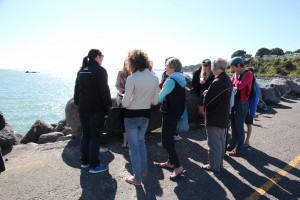
‘Little blue penguin Taranaki’ was reunited with her rescuer at Port Taranaki.
“It’s awesome to see her again! When I got the phone call this morning to come back down and be a part of her release there was no way I was turning that down,” said Ayla Adlam.
“To see her where she is meant to be is just awesome. Everyone’s efforts and time has all paid off.
“She is really cute and quite chubby now.”
Ayla spotted the little blue penguin as she neared the boat ramp after a day of fishing with her partner and another friend on January 6.
“As we were coming back into the boat ramp I noticed a little penguin just kind of swimming around in circles just looking distressed and really close to the boats.
“My partner suggested that we ring DOC as I was a little bit upset about seeing an injured penguin out there.”
Ayla got out her smart phone, googled DOC’s website and gave them a call. Her call was answered by Gemma Green who located the penguin and organised for her to be sent to Massey University’s Wildbase Hospital in Palmerston North.
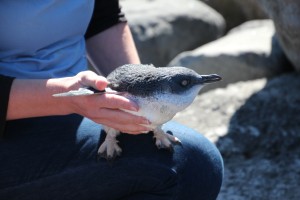
Named ‘Little Blue Penguin Taranaki’ on her arrival at Wildbase her wounds were carefully assessed.
“She had a very large laceration on her leg and deep muscle trauma with that. We gave her an anaesthetic and took a radio graph to make sure there were no fractured bones associated with that wound. Often when dogs bite they shake so this girl was quite lucky that there wasn’t any other trauma,” said Supervisor Wildlife Technician, Pauline Nijman.
“She had several surgeries to clean out the wound before we could close it. So that just means a couple of anaesthetics for her and in the mean time we treated her with antibiotics, lots of fluids and love, lots of fish of course she never says no to fish and some pain relief of course to make her comfortable.”
Little Blue Penguin Taranaki actually moulted while in care which meant that she didn’t need to wait in hospital for her feathers to regrow.
“Penguins moult when they get nice and fat at this time of the year. When there is food on tap like at Wildbase that’s quite easy to happen.”
Once her wound had healed she started physio. She was put on a treadmill to see how she was using her leg.
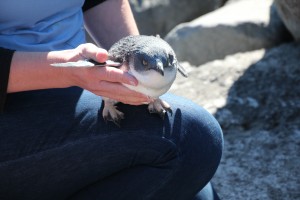
“When she was on the treadmill we could see that she wasn’t walking normally and it was a bit of a guarded prognosis at this point as if they can’t use their feet normally they can’t use their feet to scratch and maintain their feathers and water proofing on their head. We wouldn’t actually release a bird that couldn’t use their legs in full function because they would probably be quite disabled in the wild and be likely to die.”
After a couple of treadmill sessions she showed a huge improvement and was able to walk properly. The focus then shifted to her fitness training where she was put in a big pool to encourage her to dive which exercises her pictorial muscles and to ensure she has her full waterproofing before being released.
“When they are in hospital they are in a confined space. They are sitting and healing and of course getting fat. So there is not a lot of fitness involved. Of course the wild is not a very kind place so you don’t want to be a couch potato and then be told you have to run a full marathon. You might want to train a little before you do that.”
After a few weeks of pool fitness and spending nine hours in the clinic pool “just chilling out” her waterproofing was deemed to be perfect and it was time for her to be released back where she was rescued.
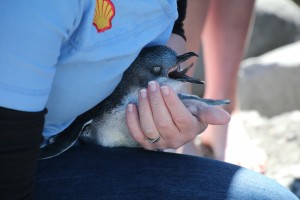
“I bought her a little snack pack of fish because she hasn’t had any breakfast this morning. I just thought it would be nice to release her on a full tummy so she can just go out and get her bearings and then she can hopefully live a long and prosperous life.”
“The sole goal for us is to return these animals back to the wild so they will continue their species.
“Unfortunately there are a lot of species that you release and assume that is all is well. I will be driving back to Palmerston North worrying because that’s what I do.
“Wild releases are a cool part of our job but I tend to not like it so much because I worry about our ‘kids’. But we can’t really track every animal.
“A lot of the endangered species are banded and have transmitters so we know how they are going down the track. For the common species there are not enough resources to do that kind of stuff. I know she is tough I can vouch for her.”
As Ayla saw Little Blue Penguin Taranaki swim away she said “I’m glad I could help her. It is just the right thing to do. It is so easy to get help in those situations.”
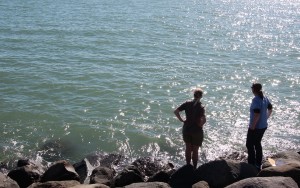
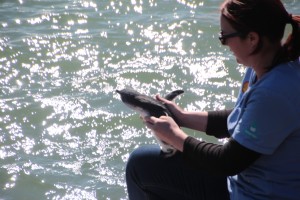
If you find injured wildlife call the Department of Conservation on 0800 362468 (0800 DOCHOT). DOC says to be careful when catching wildlife as animals may bite and have sharp claws.
For more information on Wildbase or to make a donation go to:-
